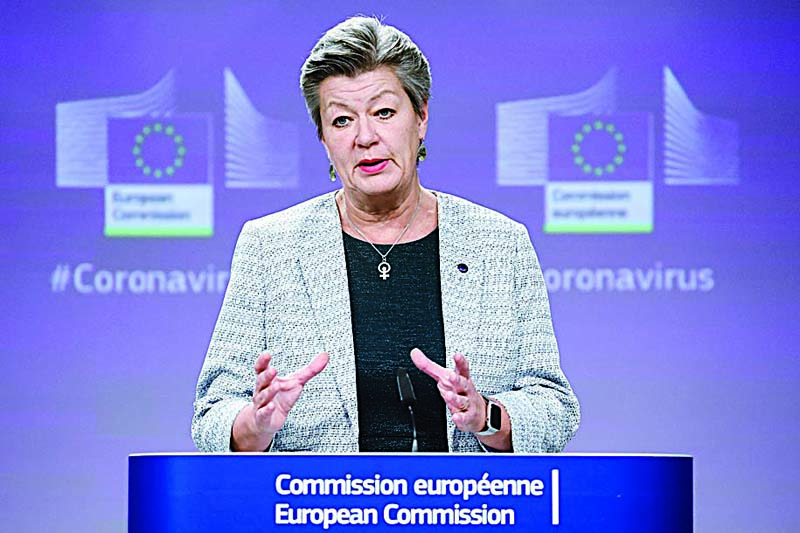 BRUSSELS: European Union commissioner for Home Affairs Ylva Johansson speaks during a press conference on travelling from outside the EU during the COVID-19 pandemic at the EU headquarters in Brussels yesterday.-AFP photos
BRUSSELS: European Union commissioner for Home Affairs Ylva Johansson speaks during a press conference on travelling from outside the EU during the COVID-19 pandemic at the EU headquarters in Brussels yesterday.-AFP photos
BRUSSELS: Europe yesterday reached the grim milestone of 1.5 million coronavirus deaths as nations scramble to tackle a worsening crisis with winter approaching. In response, France accelerated its COVID booster rollout and Germany, with fatalities and infections surging, weighed new measures. With the world braced for the full onslaught of yet another wave, the EU's medicines agency cleared a vaccine for children as young as five. But South Africa reported a new worrying COVID-19 variant with devastating potential, the EU medicines agency cleared a vaccine for children as young as five.
In Paris, Health Minister Olivier Veran said COVID-19 booster shots, until now only available to people over 65 or with health problems, would be accessible to all adults starting this weekend. From January 15, people over 18 would need to show proof of a top-up vaccine dose to maintain a valid COVID pass, which is required to enter restaurants, bars, gyms and other public venues.
The minister said the stringent measure could see France through the fifth wave without recourse to another lockdown, which the government is desperately trying to avoid. Adding pressure, the EU Commission recommended that the bloc's vaccination certificate should become invalid once the holder's latest dose is more than nine months old.
 LES ABYMES, France: Demonstrators hold placards during a protest march against measures to limit the spread of COVID-19 in Les Abymes, outside Pointe-a-Pitre, on the French Caribbean island of Guadeloupe, on Wednesday.
LES ABYMES, France: Demonstrators hold placards during a protest march against measures to limit the spread of COVID-19 in Les Abymes, outside Pointe-a-Pitre, on the French Caribbean island of Guadeloupe, on Wednesday.
'Grim milestone'
The number of daily new cases in France hit a seven-month high of 32,591 on Wednesday but the burden of critical cases in hospital remains manageable-a fact experts put down to France's energetic vaccination drive. Neighboring Germany meanwhile reported record coronavirus fatalities and infections yesterday as its total death toll passed 100,000 -- a "grim milestone", said Bild daily-just as a new government prepared to replace Angela Merkel's coalition.
Europe's largest economy recorded 351 COVID fatalities in the past 24 hours, bringing the official death toll since the start of the pandemic to 100,119. The weekly incidence rate also hit an all-time high of 419.7 new infections per 100,000 people, according to the Robert Koch Institute health agency. Back in Europe, the Pfizer/BioNTech jab got the green light for five to 11 year-olds, clearing the way for the vaccination in an age group where the virus is rapidly spreading, and bringing the EU into line with the US, Israel and Canada. The European Medicines Agency, using the jab's brand name, said "the benefits of Comirnaty in children aged five to 11 outweigh the risks".
The EU cleared Pfizer's COVID-19 vaccine for use in children aged five to 11 yesterday, the first jab to be approved in a cohort where the virus is rapidly spreading. Only a small handful of countries had previously given the nod for coronavirus vaccinations in younger children, including the United States, Israel and Canada.
"I'm glad to tell you that Comirnaty from today has received approval for children five to 11 years of age," said Marco Cavaleri, head of vaccine strategy at the European Medicines Agency (EMA), using the vaccine's brand name. "This is based on a different dose in the one used in adults, essentially it's a much lower dose," he told an online public meeting.
The vaccine was already cleared for use in people aged 12 and over in the 27-nation EU. Children aged five to 11 will be given one third of the dose that older people receive, with two injections, three weeks apart, the EMA said in a statement. The vaccine was 90.7 percent effective in a study of nearly 2,000 children of that age, it added.
Side effects were usually "mild or moderate" lasting a few days, and included pain in the injection site, tiredness, headache, muscle pain and chills. The EMA "therefore concluded that the benefits of Comirnaty in children aged five to 11 outweigh the risks, particularly in those with conditions that increase the risk of severe COVID-19." But the Pfizer jab's safety in children "will continue to be monitored closely".
'Rare in children'
Health authorities say children make up an increasing proportion of new cases and hospitalizations in Europe, which is back at the center of the coronavirus pandemic. Children are also considered key drivers of infections even when they themselves do not come down with symptoms. In the Netherlands, where the EMA is based, authorities said earlier this week that the largest increase in cases was among children up to the age of 12. - AFP




